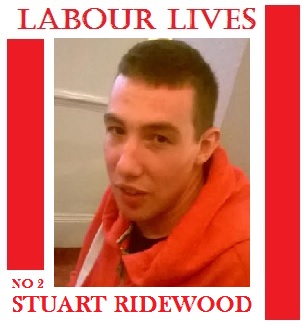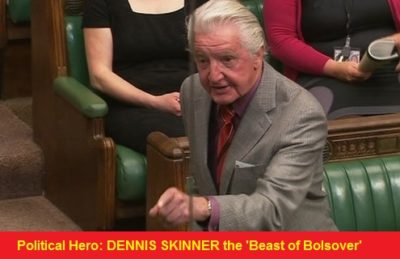 Zero Hours turned STUART RIDEWOOD from fence-sitter to active member of Bridgwater Labour. What does it mean to you to be a Labour party member? This is the question Anthony Lipmann asked one of our younger and committed members, Stuart Ridewood.
Zero Hours turned STUART RIDEWOOD from fence-sitter to active member of Bridgwater Labour. What does it mean to you to be a Labour party member? This is the question Anthony Lipmann asked one of our younger and committed members, Stuart Ridewood.
Born in Taunton, educated at Haygrove Academy in Bridgwater, at 28 he finds himself in the vortex of Zero Hours contracts. Discharging between 80,000 and 120,000 cases in a 12 hour day his team at Morrisons are part of the legions of Zero Hours workers making life apparently easier for the consumer but with little prospect of personal stability, on-the-job training, or advancement. Stuart says he is not even worried so much about the money as the lack of respect in the system for a person’s work.
Seeing life not from the Westminster bubble but the Zero Hours bubble has turned Stuart from spectator to activist.
I ask him how many of his contemporaries are members of a political party and what made him step across the line to become a political junky like the rest of us?
‘My generation moan a lot but sit on the fenc e’, he says, ‘the majority don’t vote. They think politicians are all the same’. But, like so many of us who have just joined the party, he adds – ‘Corbyn is not the same’.
2010, followed by the hung parliament, was Stuart’s first election. I am fascinated by how Stuart is attracted to politics when so many others – many who have good reason to be motivated – are apathetic. Did he come from a political household perhaps? No. Apparently, Mum works in the public sector and complains about it, but not enough to get involved. Dad is not too keen to talk politics either. But grandfather was a senior shop steward at Cellophane and then a Health and Safety Officer at Hinkley A.
Stuart is not work shy. ‘When I was still at school, I did 5 paper rounds per morning at weekends and could earn £120 a week’. Mum did not have much money coming in and the family lived in a council house”. Stuart deplores the loss of social housing, which ties into his big theme – the way housing and Zero Hours contracts define the working poor.

Just supposing for a moment that Zero Hours worked for both employers and employees, Stuart points to the incompatibility of a mobile workforce without the concomitant ability to move home. If rented accommodation in the private sector is expensive, and social housing is full up, Zero Hours workers cannot easily transfer to where the work is wanted. The Zero Hours trap appears to condemn its workers to a life without the creditworthiness to rent, let alone the prospect of owning a property, while suffering the ever present threat of eviction if rents are not paid up due to a loss of erratic hours.
Stuart’s sense of Labour Party history is impressive.
We talk about the origins of the Independent Labour Party founded in 1893 and he reflects ruefully that in the specific sense of Zero Hours we have gone back to Victorian times – in fact, the very origins that gave rise to the Labour movement. The idea of collective bargaining that began to enable workers to have more leverage over large employers. It would not be unfair to suggest that Zero Hours (which is ‘employment stripped of its rights’) appears to auction labour/work to the lowest bidder. I do not know if it is right, but Stuart is disgruntled that some unions have either embraced, or are in tacit acceptance of, Zero Hours.
This brings me to enquire about ‘Where Stuart goes to obtain his political information?’ He gets out his mobile with a mint fresh headline ‘Universal Credit has caused untold hardship. But the worst is yet to come’. Curated by non-tax paying Google, based on an algorithm of sites visited, Stuart is the recipient of regular doses of news on subjects of interest.
We then admit to the shared guilty pleasure of being avid watchers of the BBC Parliament Channel (Surely the most under-rated channel in visual media?). I can go hours watching a select committee or late night debate. Apparently Stuart can too, and we agree that here is one of the engine rooms of democracy, the place where the business of parliament takes place away from the heady entertainment of PMQs.
Who are Stuart’s political heroes?
 He offers these with fantastic fairmindedness – hero above all is Dennis Skinner (the beast of Bolsover) , famous for sitting on the front bench just down wind of every Prime Minister of the day, electrifying the house with the heckles that make politics so invigorating. But on the Conservative side he is respectful of Bill Cash (Stuart voted for Brexit, as I did, but that is another story), John Redwood and Ken Clarke. In the media, Andrew Neil, BBC Channel 4 TV, Question Time (biased in his view, ‘things don’t really get debated’), and The Guardian. ‘I also read Tory papers and I do respect a few members of the Tory party.’
He offers these with fantastic fairmindedness – hero above all is Dennis Skinner (the beast of Bolsover) , famous for sitting on the front bench just down wind of every Prime Minister of the day, electrifying the house with the heckles that make politics so invigorating. But on the Conservative side he is respectful of Bill Cash (Stuart voted for Brexit, as I did, but that is another story), John Redwood and Ken Clarke. In the media, Andrew Neil, BBC Channel 4 TV, Question Time (biased in his view, ‘things don’t really get debated’), and The Guardian. ‘I also read Tory papers and I do respect a few members of the Tory party.’
‘What do you (did you) think about New Labour then?’ His answer will perhaps echo with the vast majority of the new intake – ‘I really do not know why they called it New Labour as the whole object was to tell the public they were not Labour!’
Stuart is a remarkable young man, one of the many new foot soldiers out there experiencing injustice in the workplace and studying its causes; not sitting on the fence – but campaigning for things to get better, winning the battle of ideas. He is a credit to the Labour Party that is fervently hoping to win the next general election.
Anthony Lipmann 01.09.2017
New Member of the Labour Party
